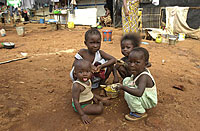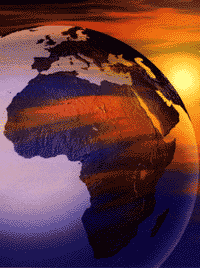
INTRODUCTION
The continent of Africa is constantly changing, most recently as a result of the withdrawal of the colonial powers and their replacement by new forms of domination. These changes have been exacerbated by the ensuing economic catastrophes, wars, and by policies designed outside the continent.
The WCC's special focus on Africa began when its eighth assembly in Harare in 1998 called on the ecumenical family to accompany the churches in Africa on a journey towards a new vision for Africa. The assembly challenged the WCC and its constituencies to support, accompany and help churches in Africa to set their own agenda by placing a special focus on Africa during the beginning of the 21st century.
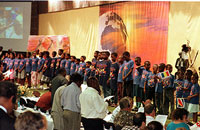
Africa plenary at the WCC's eighth assembly in Harare, Zimbabwe, in 1998
The September 1999 central committee meeting identified three broad areas as a basic framework for a revitalized Africa Reconstruction Programme :
The programme's broad goals are, accordingly :
Victims of violence
|
The programme has energized and motivated existing church and ecumenical networks into concerted action towards formulating a new vision for Africa. These networks include:
Challenges to church and society
Three critical challenges to church and society in Africa have been
identified: the nature and role of the nation-state, violence, and corruption.
It is becoming increasingly clear that the nation-state model
is not working in Africa. The very legitimacy of the current model is
at stake. A concerted effort to re-imagine the nation-state in Africa
should be built into the ecumenical agenda in the twenty-first century.
In Africa, violence is structural and systemic (economic, social, cultural), as well as physical and self-inflicted. Of great concern here is the emergence of self-financing civil wars in Africa. The civil war in Angola heralded a trend that was later repeated in several other countries in Central and Western Africa. Ongoing civil wars are fought, not on ideological grounds, but about who controls economic wealth. Godís blessing of mineral resources is being turned into a curse for innocent people. The ecumenical movement is called not only to advocate overcoming such forms of violence, but also to challenge the legitimacy of the civil wars in Africa.
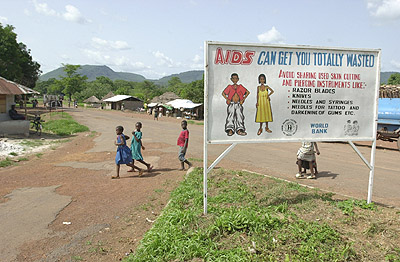
Sign warning of the dangers of AIDS, Sierra Leone
Corruption and graft exist in all countries of the world. What passes in some European countries as commissions would be considered as corruption in others. So we cannot say that corruption only exists in the South. However, a society where corruption and graft are institutionalized and generally accepted as a norm will hardly progress in anything.
In many countries of Africa, corruption has become a cancer whose treatment requires nothing short of surgery. Even more than the political and economic crises, the moral crisis poses the greatest challenge to Africa. Moral leadership is the most critical area in which the church is expected to play a specific role.
Through the Fellowship of Churches and Councils in West Africa (FECCIWA), the ARP has supported and facilitated churches to address the issue of corruption. A consultation that brought African national councils of churches together to deliberate on the ethical challenges posed by corruption will help the churches continue their efforts to overcome corruption at the national level.
An African renaissance calls for the people of Africa to rediscover their soul. An African renaissance is therefore a journey of self-rediscovery, and restoration of Africans' own self-esteem. Churches and ecumenical networks that have taken up the theme of African renaissance are seeking the specific input Christians can bring to this imperative. In the context of an Urban Rural Mission (URM) Global Working Group meeting in Dakar, Senegal, in March 2001, the Africa URM sponsored a forum on African renaissance and social justice. ARP input focused on spirituality as the foundation of just, peaceful and environmentally sustainable communities.
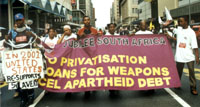
During the August 2001 World Conference Against Racism NGO Forum in Durban, South Africa, Jubilee South Africa and Jubilee South joined a march of more than 10,000 people from Southern Africa and all over the world, hosted by Durban Social Forum
Major attention in 2000 and the first quarter of 2001 focused on supporting African debt campaign initiatives such as Africa Jubilee 2000. National campaigns against debt and structural adjustment programmes (SAPs) culminated into a pan-African consultation in December 2000 in Dakar.
This consultation, known as Dakar 2000, came up with a declaration entitled Africa: from Resistance to Alternatives, which says
"...The total and unconditional cancellation of the African debt is a demand based on undisputed economic, social, moral, legal and historical arguments, because the debt problem is not a financial or technical issue as the World Bank and the IMF are tempted to demonstrate. It is fundamentally a human, social and political problem.
Debt service and conditionalities associated with debt have contributed to the aggravation of poverty. Moreover, debt has been widely reimbursed: for the past few years, Africa has been transferring more resources to developed countries than she receives. In addition, most of Africa's debt is odious, fraudulent and immoral. In fact, in most cases, debt has been contracted by non-representative regimes that have used the amount received for purposes that were not of much use to their peoples' interests. Often, this debt served to consolidate and even legitimize dictatorships that used it to oppress their own people, with the benevolence and complicity of Western countries.
Debt has also been contracted to undertake mega-projects designed to stimulate exports at the expense of the satisfaction of peopleís fundamental needs.
The reimbursement of that debt is immoral: its service is diverting resources essential in the struggle against poverty, illiteracy and AIDS.
Thus, from whatever angle we consider the issue of Africa's debt, it is unacceptable. It is all the less acceptable that the historic debt that the West has incurred from Africa is immeasurable.
Accordingly, we demand both the restitution of what has been taken from Africa for centuries by sheer force, and reparations for all the crimes and damages inflicted upon its people.
Mobilised by the Amsterdam Appeal of April 2000, we, representatives of womenís movements, youth movements, rural and urban workers, international solidarity, gathered from 11-14 December, 2000, in Dakar (Senegal), with the support of our partners of other continents, call again for the immediate and unconditional cancellation of the African debt, demand the end to Structural adjustment Programmes, even as they are renamed Poverty Reduction Strategy Programmes (PRSPs) adopt the following programme and promise to take all necessary measures for its implementation. Support has been given for follow-up work in 2001 and will continue into 2002."
Another consultation on Africa and globalization, held in Togo in September 2000 in conjunction with the World Alliance of YMCAs, focused on globalization and human rights in Africa, with special focus on youth. The AACC was represented by its youth desk . Young Africans expressed concern about the devastating impact of globalization on economic, social and cultural life in Africa.
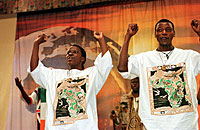
Young Africans at the WCC eighth assembly's Africa plenary, Harare, 1998
The ARP has sought to engage African youth in the quest for a new vision for Africa so as to increase their capacity to participate meaningfully in the process of social reconstruction. African youth have a huge stake in the building of more just, peaceful and ecologically sustainable societies, and their involvement in shaping such societies must be affirmed and facilitated by the ecumenical movement. A WCC/ARP-sponsored seminar on theology and globalization with young African theologians in Accra, Ghana, was a response to this challenge. In a statement drafted after a visit to the El minah slave castle near Accra, the 30 young theologians from 17 African countries declared that "El minah not only represents an oppressive system of skewed distribution of socio-political and economic power that persists to this day, but also echoes the failure of the church to denounce that system...
Yet as we gathered outside and said with our hearts, 'Never Again' to the El minah of Ghana, we find ourselves confronted by the El minah of globalization. Like the El minah of 1482, the El minah of globalization unbowed over the world and drips of poverty and injustice. It drips of oppression and greed."
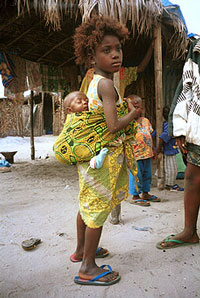
On a women-to-women solidarity visit to Liberia, an ecumenical team visited several refugee camps to talk with the women and children
Women, as women, are often targets of very specific forms of violence, and sometimes go on living in contexts of intimidation and fear after the conflict is supposedly resolved. As was said during the Sierra Leone visit, while violence against women is exacerbated in war situations, it exists even in the absence of war. Women need to feel safe to talk about the violence they experience; these visits created that space for genuine sharing.
"We went to these countries to offer international solidarity to the women; to listen and to bring back their concerns to the world. We affirm the role played by women in the peace, reconciliation and democratization process. We call on the global church to offer continuing support to women as they engage in the effort of healing and reconciliation, of reconstructing their own lives and those of their communities...
The visits drew particular attention to the children
Through our visits in refugee camps, displaced people's camps, amputee camps, church-related and secular programmes rehabilitating ex-combattants and child mothers (by rape), attention was drawn to the persistent use of rape and violence against women and children in conflict and war."
Africa Internship
The Harare assembly had asked that the ARP emphasize capacity-building
and information-sharing so as to develop solidarity within the ecumenical
family, and enable Africa to make her unique contribution to the global
Christian community. The WCC as a whole also needed to interpret the
Africa Focus. And there was an internal need to understand communication
from an African perspective, to have someone who could interpret events,
information and news from an that perspective. These various calls for
improved communication gave birth to the idea of an internship.
The intern produced a concept paper on communication in Africa, and built a database of contacts in and on Africa. He produced country profiles for internal use and participated in a joint Vesper Society-WCC project on developing a tool kit for ecumenical youth leaders' communication online. He also began work on a project designed to to examine evidence of economic violence in Southern Africa through study of agrarian and land policies, to identify responses to this violence, and to make recommendations to the WCC on how to deal with such violence within the broader framework of economic globalization.

